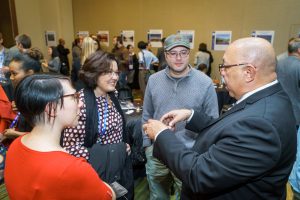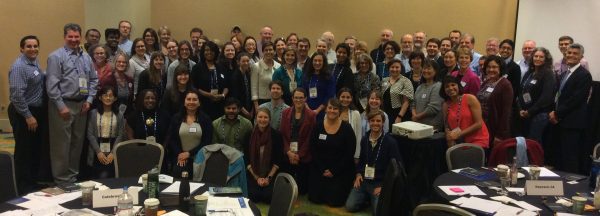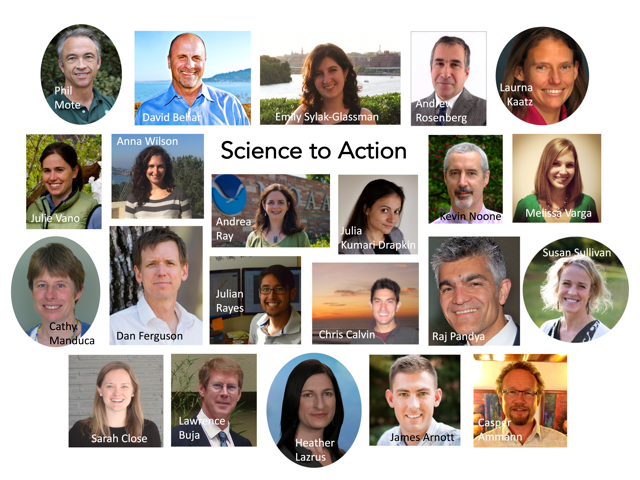 Thriving Earth Exchange at AGU Fall Meeting
Thriving Earth Exchange at AGU Fall Meeting
Science to Action
December 11-15, 2017
New Orleans, Louisiana
The “Science to Action” series at Fall Meeting aims to promote the ability of scientists, educators and communities to work together to confront concerns posed by extreme events, climate and land cover change, and natural hazards. At the AGU Fall Meeting, a series of sessions will highlight the impact of collaborations between scientists and communities, share successes and lessons learned, and inspire the continued growth of community science engagement in the Earth and space science community. All those who are new or experienced in this space are encouraged to participate in the TEX events for hands-on learning and collaboration opportunities.
[ezcol_1half]EVENTS[/ezcol_1half] [ezcol_1half_end]SCIENTIFIC SESSIONS[/ezcol_1half_end]
With more than 23,000 Earth and space scientists in 2016, AGU’s Fall Meeting is the largest Earth and space science meeting in the world. The meeting continues to be the premiere place to present your research; hear about the latest discoveries, trends, and challenges in the field; and network with colleagues that can enhance your career. Read more on the Fall Meeting website.
Planning to attend? RSVP here!
(Walk-ins are welcome for all TEX events.)
TEX Events
[ezcol_1third]Science to Action Workshop: Practical Tips and Real-World Strategies for Engaging with Communities[/ezcol_1third] [ezcol_2third_end]Community science has the power to transform your science into an impactful force for good! Join Thriving Earth Exchange staff for this workshop to learn and practice the skills needed to build effective relationships with communities to address critical local needs in climate change, natural hazards and natural resources. Early career scientists and graduate students are encouraged to attend.
10:00 – 12:00 PM, Tuesday, 12 December
Third Floor, Fulton
Hilton Riverside[/ezcol_2third_end]
[ezcol_1third]Celebrating Science to Action: Thriving Earth Exchange (TEX) Networking Reception[/ezcol_1third] [ezcol_2third_end]This annual reception provides a networking opportunity for those interested in community science engagement, outreach and partnership. TEX connects Earth and space scientists to communities around the world working towards solutions related to climate change, natural hazards, and natural resources.
6:30 – 8:30 PM, Tuesday, 12 December
Riverside Complex, Quarterdeck Ballroom
Hilton Riverside[/ezcol_2third_end]
[ezcol_1third]Science to Action in Louisiana: Thriving Earth Exchange (TEX) Project Launch Workshop[/ezcol_1third] [ezcol_2third_end]This workshop will help scientists and community leaders develop collaborative, locally impactful projects together. TEX connects Earth and space scientists to communities around the world working toward solutions related to climate change, natural hazards, and natural resources. Lunch will be provided.
(Participating communities are listed on the RSVP form.)
10:00 – 3:00 PM, Wednesday, 13 December
Second Floor, Churchill C1
Hilton Riverside[/ezcol_2third_end]
[ezcol_1third]When is a Roof more than a Roof?: A Workshop on the Integrated Benefits of Green Infrastructure[/ezcol_1third] [ezcol_2third_end]Cities, regions, and communities all over the world are investing in new infrastructure – by some estimates, half the infrastructure on the planet in 2050 has yet to be built. Increasingly, we are asking for more from their infrastructure; we want to drive economic growth, enhance local quality of life, and contribute to regional sustainability and resilience. Designing infrastructure to do this is a challenge because it requires thinking of a building as part of a larger system. This workshop will contribute to the understanding and estimating the benefits, on scales from building to regional, of green design. To make the conversation concrete and actionable, we will anchor our discussion around a new “green” roof for the New Orleans Convention Center.
1:40 – 3:40 PM, Thursday, 14 December
Room 224
New Orleans Ernest N. Morial Convention Center[/ezcol_2third_end]

Over 80 scientists and community leaders worked to launch 12 new TEX projects at the 2016 Project Launch Workshop!
Science to Action in the Scientific Program
These sessions provide a way for scientists and community leaders to share their experiences and insights as part of the formal scientific process of peer presentation and review.
The abstract submission deadline was 2 August 2017. When available, this page will be updated with the time and location of each session. To see a list of submitted abstracts, click each session title.
[ezcol_1third]Science to Action: Communities Solve Problems with Science and Scientists[/ezcol_1third] [ezcol_2third_end]From land use planning to hazard mitigation, community science refers to collaborations among scientists, science educators, decision makers and citizens to solve problems. Living sustainably and equitably on the Earth is not an easy task – using science can help solve immediate problems, uncover longer term issues, and model future scenarios. However, using science successfully requires deep collaboration to thoroughly understand the problem and its contexts as well as to evaluate the viability and consequences of various courses of action on the Earth and its inhabitants. This comes from using partnerships to design, conduct, and apply research to decision making. It depends on science education, both to enhance community understanding and capacity and to prepare scientists to work effectively with communities. This session will showcase examples of AGU members engaged in successful collaborations producing positive outcomes at local, regional, national and international scales.
U42A: Science To Action: Communities Solve Problems with Science and Scientists
Thursday, 14 December: 10:20 – 12:20
New Orleans Ernest N. Morial Convention Center – E2
[/ezcol_2third_end]
[ezcol_1third]Science to Action: Building Novel and Transformative Partnerships Toward Decision-Relevant Science[/ezcol_1third] [ezcol_2third_end]These are trying times for both scientists and local communities – dwindling financial resources, institutional barriers, spatio-temporal constraints, and a polarized electorate. Despite these roadblocks, scientists persevere to engage and collaborate with decision makers and communities to ensure science that is actionable, applicable, and usable. In this session, we explore (1) how scientists build and strengthen partnerships within and outside the research community, and (2) how these novel and truly collaborative partnerships lead to decision-relevant tools, resources, or knowledge. We invite on-the-ground stories and experiences, successes and challenges, and best practices that illustrate both increased collaborative capacity and the successful co-production of actionable science. Through this collective sharing, we can harness characteristics of effective and transformative partnerships to better understand community needs and deliver robust, science-based, and decision-relevant products and applications to our stakeholders.
PA31B Science to Action: Building Novel and Transformative Partnerships Toward Decision-Relevant Science III Posters
Wednesday, 13 December: 08:00 – 12:20
New Orleans Ernest N. Morial Convention Center – Poster Hall D-F
PA33D Science to Action: Building Novel and Transformative Partnerships Toward Decision-Relevant Science I
Wednesday, 13 December: 13:40 – 15:40
New Orleans Ernest N. Morial Convention Center – 255-257
PA34A Science to Action: Building Novel and Transformative Partnerships Toward Decision-Relevant Science II
Wednesday, 13 December: 16:00 – 18:00
New Orleans Ernest N. Morial Convention Center – 255-257
[/ezcol_2third_end]
[ezcol_1third]Science to Action: Research to Applications (R2A) to Enhance Subseasonal-to-Seasonal Water Supply and Drought Outlooks[/ezcol_1third] [ezcol_2third_end]Advances in the science of subseasonal to seasonal (S2S) climate forecasts are of critical importance to a wide range of decisionmakers for agriculture, water management, public lands and ecosystem management, who implement planning and preparedness at these time scales. The transition of S2S climate forecasts into applications is often augmented by sector-oriented information products such as drought and seasonal water supply or hydrologic outlooks, which help guide the management of water from local to regional scales. This session invites presentations from researchers, managers, and stakeholders that provide insight into efforts to improving operational S2S outlooks of drought, water supply, and streamflow, agricultural and other sectoral outcomes. Contributions might include studies of S2S predictability or forecast skill focused on regions or seasons of interest for water or drought, predictability of drought indices or seasonal snow accumulation, or descriptions of stakeholder needs and decision challenges that would benefit from S2S forecast information.
PA11B: Science to Action: Research to Applications (R2A) to Enhance Subseasonal to Seasonal Water Supply and Drought Outlooks II Posters
Monday, 11 December: 08:00 – 12:20
New Orleans Ernest N. Morial Convention Center – Poster Hall D-F
PA14A: Science to Action: Research to Applications (R2A) to Enhance Subseasonal to Seasonal Water Supply and Drought Outlooks I
Monday, 11 December: 16:00 – 18:00
New Orleans Ernest N. Morial Convention Center – Poster Hall 255-257
[/ezcol_2third_end]
[ezcol_1third]Science to Action: Resilient Decision Making in the Midst of Uncertainty[/ezcol_1third] [ezcol_2third_end]Decision makers who manage natural resources, infrastructure, and emergency response systems to support water, energy, and food security face a myriad of uncertainties when assessing risk. These uncertainties are likely to increase in the future as infrastructure ages, temperatures increase, precipitation patterns change and intensify, populations grow, and economies change. While probabilistic information and uncertainty have always been an integral part of planning, design, and management decisions, future changes in natural and human systems are forcing a re-assessment of how we understand and interpret risk. This session focuses on approaches that embrace uncertainty and work in partnership with decision makers to uncover ways to support adaptive management and resilient planning in the midst of an uncertain world. We seek innovators who bridge research and operations and welcome examples focused on improving day-to-day operations (e.g., streamflow forecasting, flood risk management) and long-term planning (e.g., planning and infrastructure design for sea-level rise).
PA51B: Science to Action: Resilient Decision Making in the Midst of Uncertainty I
Friday, 15 December: 08:00 – 10:00
New Orleans Ernest N. Morial Convention Center – 255-257
PA53B: Science to Action: Resilient Decision Making in the Midst of Uncertainty II Posters
Friday, 15 December: 13:40 – 18:00
New Orleans Ernest N. Morial Convention Center – Poster Hall D-F
[/ezcol_2third_end]
[ezcol_1third]Science to Action: Effective Co-Production – Will Science meet the high demands of Practitioners and Decision Makers?[/ezcol_1third] [ezcol_2third_end]This session will explore how the needs and expectations of practitioners are being addressed in climate science and assessment. Practitioners continuously seek the best and most useful science to inform their decisions. Common requests range from higher resolution and more accurate projections, to recommendations on what models and translational tools are ‘best’ for a given geographical location and decision context, to “What is the maximum event that I need to plan for?” Presented here are examples of how climate and regional models are integrating decision-maker needs and priorities into scientific development, evaluation, and assessment processes.
PA43B Science to Action: Effective Coproduction–Will Science Meet the High Demands of Practitioners and Decision Makers? Posters
Thursday, 14 December: 13:40 – 18:00
New Orleans Ernest N. Morial Convention Center – Poster Hall D-F
[/ezcol_2third_end]
[ezcol_1third]Science to Action: Toward More Effective Decision Maker-Scientist Partnerships[/ezcol_1third] [ezcol_2third_end]Climate extremes, variability, and change and their consequences for hydrological, ecological, and human systems require decisions be made now to avoid future system failures. The traditional model of science calls for scientists to understand what future changes may be and then decision makers will take action on this knowledge. In reality, this linear model rarely works and results in a disconnect between the information generated by scientists and decisions being made. This session will explore how scientists and decision makers can work together to produce more actionable science. We seek experiences that reveal what effective partnerships between science and applications look like and how they can be improved and shared. We especially welcome specific examples of processes or products that demonstrate and teach better practices, or practices to avoid, when including science in decision making.
PA41A Science to Action: Toward More Effective Decision Maker-Scientist Partnerships III Posters
Thursday, 14 December: 08:00 – 12:20
New Orleans Ernest N. Morial Convention Center – Poster Hall D-F
PA43D Science to Action: Toward More Effective Decision Maker-Scientist Partnerships I
Thursday, 14 December: 13:40 – 15:40
New Orleans Ernest N. Morial Convention Center – 255-257
PA44A Science to Action: Toward More Effective Decision Maker-Scientist Partnerships II
Thursday, 14 December: 16:00 – 18:00
New Orleans Ernest N. Morial Convention Center – 255-257
[/ezcol_2third_end]
[ezcol_1third]Connecting Environment, Technology, and Society: Decision Support Tools for Built Environments [/ezcol_1third] [ezcol_2third_end]What is the value added of climate science and the climate scientist in climate adaptation planning? As decision-makers grapple with understanding and preparing for challenges such as climate change, the magnitude of information, associated uncertainties, and non-predictive nature of this deep uncertainty begs the question of what role the climate expert plays in the decision-making process. The session will begin with stage setting presentations on topics such as weather generators versus process based climate modeling, concluding with a facilitated debate and a community discussion regarding the value added of climate science and the climate scientist in climate adaptation and decision making under deep uncertainty.
H14C Connecting Environment, Technology, and Society: Decision Support Tools for Built Environments I
Monday, 11 December: 16:00 – 18:00
New Orleans Ernest N. Morial Convention Center – 293-294
H11C Connecting Environment, Technology, and Society: Decision Support Tools for Built Environments II Posters
Monday, 11 December: 08:00 – 12:20
New Orleans Ernest N. Morial Convention Center – Poster Hall D-F
[/ezcol_2third_end]
[ezcol_1third]Native Science: How Indigenous Perspectives Inform Environmental Science and Policy[/ezcol_1third] [ezcol_2third_end]Perspectives of indigenous peoples can bring deep insight to the study and management of complex environmental systems through their holistic approaches to problem solving and ways of knowing. These perspectives can inform and enrich western scientific research and discussions of policy in areas related to sustainability, human-environment interactions, ecosystems, climate adaptation, geohealth, and more. Although western science has begun to acknowledge the importance of indigenous knowledge, voices of indigenous peoples are largely absent from scholarly discourse. With this in mind, we welcome submissions focusing on indigenous voices and perspectives in environmental sciences and policy emphasizing meaningful collaborations between western scientists and indigenous communities, or on indigenous scholars’ experiences walking in both worlds. Submissions may be case studies, syntheses, or other scholarship focusing on one or more indigenous tribe, group, or organization. We also welcome perspectives discussing relevant issues surrounding community based participation, ethics, mutual understanding, and respect for sacred knowledge.
PA52A: Native Science: How Indigenous Perspectives Inform Environmental Science and Policy I
Friday, 15 December: 10:20 – 12:20
New Orleans Ernest N. Morial Convention Center – 255-257
PA53A: Native Science: How Indigenous Perspectives Inform Environmental Science and Policy II Posters
Friday, 15 December: 13:40 – 18:00
New Orleans Ernest N. Morial Convention Center – Poster Hall D-F
[/ezcol_2third_end]

Questions? Email [email protected] or chat with us on Twitter!

